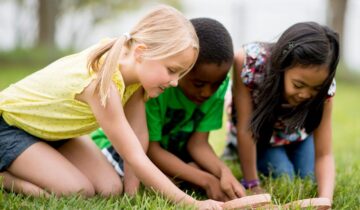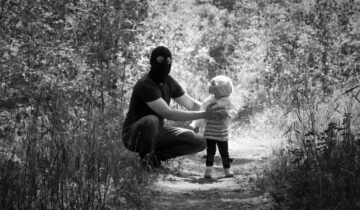Talking to kids about personal safety is an important part of parenting. Parents must be aware of the risks and dangers that their children may face in everyday life and how to protect them from harm. Parents should start as early as possible by teaching children basic safety rules like not talking to strangers, not going off alone, and understanding the importance of avoiding dangerous situations. Starting early and having open conversations with kids about personal safety can help ensure that their children are well-equipped to handle potential risks they may face daily.
Here are some tips for having these conversations:
Use age-appropriate language
Talking to kids about safety is an important part of parenting, but knowing how to approach the topic can be difficult. To ensure your message is heard and understood, it’s essential to use age-appropriate language when discussing safety with children. By using language that is tailored to their age level, you can ensure that your message is clear and effective. Additionally, using age-appropriate language can help build trust between you and your child. They will feel more comfortable discussing safety topics if they understand what you are saying.
Encourage open communication
Open communication between parents and their children is essential for a healthy relationship. It helps to foster trust and understanding and allows parents to provide guidance and support to their children. It also encourages children to express themselves freely, which can help them develop better social skills.
Open communication between parents and their children should be encouraged early. This not only helps the child understand the world around them better, but it also helps them develop self-confidence as they learn how to express themselves more effectively. Parents should listen carefully to their child’s ideas, feelings, and concerns to build strong trust between them. Open communication also allows parents to provide appropriate guidance when needed while still allowing the child room for growth and exploration. Let kids know they can come to you with any questions or concerns they have. Create a safe and supportive environment where they feel comfortable talking to you.
Teach about body boundaries
Teaching children about body boundaries is an important step in helping them develop healthy relationships with themselves and others. It can help children understand that their bodies are their own and that they have the right to say “no” to any unwanted physical contact. Knowing about body boundaries can also help children recognize when someone else’s boundaries are being crossed and how to respond safely and appropriately. By teaching kids about their own body boundaries, we can give them the tools they need to navigate relationships confidently and safely.
Teach about stranger safety
As parents, we are responsible for the safety of our children. Teaching children about stranger safety is a crucial part of this responsibility. It is an important step in helping them to understand the potential dangers of interacting with strangers and how to protect themselves from harm.
Educating children about stranger safety can equip them with the knowledge they need to make wise decisions when faced with unfamiliar people and situations. We can also help them develop the skills they need to recognize potentially dangerous situations and take appropriate action if necessary. With this knowledge, children will be better prepared for encounters with strangers in their everyday lives.
Empower kids to take action
As parents, we should encourage our kids to take action and make a difference in their communities. We can empower them to make an impact by teaching them about their rights, giving them the tools they need to succeed, and showing them that their voice matters. By doing this, we can help our kids become active citizens engaged in their communities and make real change. We should also be providing our kids with opportunities to take action, such as volunteering or joining a club or organization that is focused on making a difference. Through these experiences, they will learn how to use their skills and knowledge to create positive change in the world around them.
Provide practical safety tips
As parents, we are responsible for ensuring that our children are safe from harm. We must equip them with the knowledge and skills needed to stay safe in any situation. Providing practical safety tips for children is one of the best ways to do this. Teach kids what to do if they become lost, such as finding a police officer or store employee for help.
It helps them understand the importance of being aware of their surroundings and how to react if they find themselves in a dangerous situation. It also teaches them about potential risks and how to avoid them. Providing practical safety tips for children can help them grow up with a greater sense of security and confidence in their abilities.
Keep the conversation positive
As parents, it is important to keep the conversation positive when talking to our kids about safety. We should teach them ways to stay safe instead of scaring them with stories and warnings. By doing this, we can help our children understand the importance of safety in a more positive way.
We should also talk to our kids about the consequences of not taking safety measures and how they can protect themselves from harm. This will help them develop a sense of responsibility and awareness that will empower them to make better decisions in the future.
By keeping the conversation positive when talking about safety with our kids, we can ensure that they grow up with an understanding of how to stay safe without feeling scared or overwhelmed by the potential dangers around them.
Reinforce what they have learned
As parents, we are responsible for ensuring that our children are safe and secure. We should teach them the importance of safety and reinforce the safety lessons we have taught them. This will help them remember the safety rules and be able to apply them in their daily lives.
Reinforcing what our children have learned about safety is important because it helps to instill a sense of responsibility in them. It also helps to build their confidence and teaches them how to make good decisions when faced with potential danger or risk.
By reinforcing these lessons, we can ensure that our children are well-equipped with the knowledge and skills they need to stay safe in any situation.
Child safety is not only about protecting them from physical danger but also from psychological and emotional harm. We must be mindful of the society we live in and the potential dangers that come with it. By having open conversations with our children about safety, we can help them become more aware and responsible citizens who can make good decisions when faced with difficult situations.




 No products in the cart.
No products in the cart.